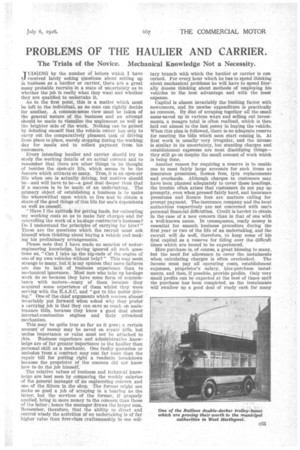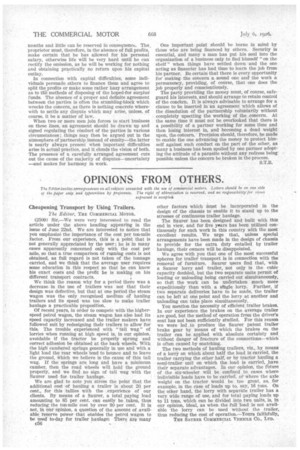PROBLEMS OF THE HAULIER AND CARRIER.
Page 45

Page 46

If you've noticed an error in this article please click here to report it so we can fix it.
The Trials of the Novice. Mechanical Knowledge Not a Necessity.
JUDGING by the number of letters which I have received lately asking questions about setting up in business as a haulier or carrier, there are a great many probable recruits in a state of uncertainty as to whether the job is really what they want and whether they are qualified to undertake it.
As to the first point, this is a matter which must be left to the individual, as no man can rightly decide for another. A common-sense view must be taken of the general nature of the business and an attempt should be made to visualize the unpleasant as well as the brighter side of the work. Nothing can be gained by deluding oneself that the vehicle owner has only to carry out the comparatively pleasant task of driving from place to place, merely stopping during the working day for meals and to collect payment from his customers.
Every intending hanker and carrier should try to study the .working details of an actual concern and to remember that there are other things to be thought of besides the open-air life, which seems to be the feature which attracts so many. True, it is an open-air life when one is actually driving, but motives should be—and will have to be—a good deal deeper than that if a success is to be made of an undertaking. The primary object of establishing a business is to make the wherewithal upon which to live and to obtain a share .of the good things of this life for one's dependents as well as oneself.
" Have I the aptitude for getting loads, for estimating my working costs so as to make fair charges and for controlling the work of a hatilage contractor's business? Do I understand the principles of carrying for hire? " These are the questions which the recruit must ask himself when thinking about buying a vehicle and making his preliminary arrangements.
Please note that I have made no mention of motorengineering knowledge, having ignored all such questions as, "Can I take up the big-ends of the engine of one of my own vehicles without help 'V' This may seem strange to many, but it is my opinion that more failures are due to lack of business experience than to mechanical ignorance. Most men who take up haulage work do so because they, have some form of acquaintance with motors—many of them because they acquired some experience of them. whilst they were
serving with the and "got to like motor driving." One of the chief arguments which novices almost invariably put forward when asked why they prefer a carrying job is that they can save so much on maintenance bills, because they know a good deal about internal-combustion engines and their attendant mechanism.
This may be quite true so far as it goes; a certain amount \ of money may be saved on repair bills, but undue importance or value must not be attached to this. Business experience and administrative knowledge are of far greater importance to the haulier than personal skill as a mechanic. One faulty quotation or omission from -a contract may cost far more than the repair bill for putting right a roadside breakdown because the proprietor of the concern did not know how to do the job himself.
The relative values of business and technical knowledge are best seen by comparing the weekly salaries of the general manager of an engineering concern and one of the fitters in the• shop. The former might not make so good a job of scraping in a bearing as the latter, but the services of the former, if properly applied, bring in more money to the concern than those of the latter ; hence the manager draws the larger sum. Remember, therefore, that the ability to direct and control wisely the activities of an undertaking is of far higher value than first-class craftsmanship in one soli
tary branch with which the haulier or carrier is concerned. For every hour which he has to spend thinking about mechanical problems he will have to spend literally dozens thinking about methods of employing his vehicles to the best advantage and with the least expense.
Capital is almost invariably the' limiting factor with newcomers, and its unwise expenditure is practically as common. By dint of scraping together all the small sums 'saved up in various ways and selling out investments, a meagre total is often realized, which is then laid out almost to the last penny in buying the vehiCle. When this plan is followed, there is no adequate reserve for meeting the bills which soon start coming in. At first work is usually 'very irregular, and the income is similar in its uncertainty, but standing charges and establishment expenses are most disobliging things— they still go on despite the small amount of work which is being done.
Another reason for requiring a reserve is to enable one to meet fairly large accounts for such items as insurance premiums, licence fees, tyre replacements and overhauls. Although charges to customers may have been planned adequately to cover these headings, the trouble often arises that customers do not pay up promptly, even when pressed fairly hard, and insurance premiums and licence fees are matters calling for prompt payment. The insurance company and the local authorities respectively are not concerned with one's personal financial difficulties. Credit is harder to obtain in the case of a new concern than in that of one with a well-known name. In consequence, ready money is essential for smooth business procedure during the first year or two of the life of an undertaking, and the recruit will do well, therefore, to keep some of his first capital as a reserve for tiding over the difficult times which are bound to be experienced.
Hire purchase is, of course, a great blessing to many, but the need for allowance to cover the instalments when calculating charges is often overlooked. The inconie must pay all operating costs, establishment expenses, proprietor's salary, hire-purchase instalments, and then, if possible, provide profits. Only very small profits can be expected at the best of times until the purchase has been completed, as the instalments will swallow up a good deal of ready cash for many months and little can be reserved in consequence. The, proprietor must, therefore, in the absence of full profits, make certain that he has allowed for his personal salary, otherwise life will be very hard until he can rectify the omission, as he will be working for nothing and obtaining practically no return upon his capital outlay.
In connection with capital difficulties, some individuals persuade others to finance them and agree to split theprofits or make some rather hazy arrangement as to the methods of disposing of the hoped-for surplus funds. The absence of a proper and definite agreement between the parties is often the stumbling-block which wrecks the concern, as there is nothing concrete wherewith to settle any dispute which may arise, unless, of course, it be a matter of law.
When two or more men join forces to start business on these lines, an agreement should be drawn up and signed regulating the conduct of the parties in various circumstances ; things may then be argued out in the atmosphere of partnership instead of enmity—the latter is nearly always present when important difficulties arise in actual practice, and it clouds the vision of both. The presence of u carefully arranged agreement cuts out the cause of the majority of disputes—uncertainty —and makes for harmony in work.
One important point should be borne in mind by those who are being financed by others. Security is essential, and many a man has put his soul into the organization of a business only to find himself "on the shelf" when things have settled down -and the one acting as financier has had time to learn the job from his partner. Be certain that there is every opportunity for making the concern a sound one and' the work a permanency, providing, of course, that one does the job properly and conscientiously.
The party providing the money must, of course, safeguard his interests, and should arrange to retain control of the coneern. It is always advisable to arrange for a clause to be inserted in an agreement which allows of the dissolution of the partnership voluntarily without completely upsetting the working of the concern. At the same time it must not be overlooked that there is a possibility of a partner working for some time and then losing interest in, and becoming a dead weight upon, the concern. Provision should, therefore, be made to enable the one advancing the money to protect himself against such conduct on the part of the other, as many a business has been spoiled by one partner adopting the attitude of a parasite without any redress being possible unless the concern be broken in the process.
S.T.R.
















































